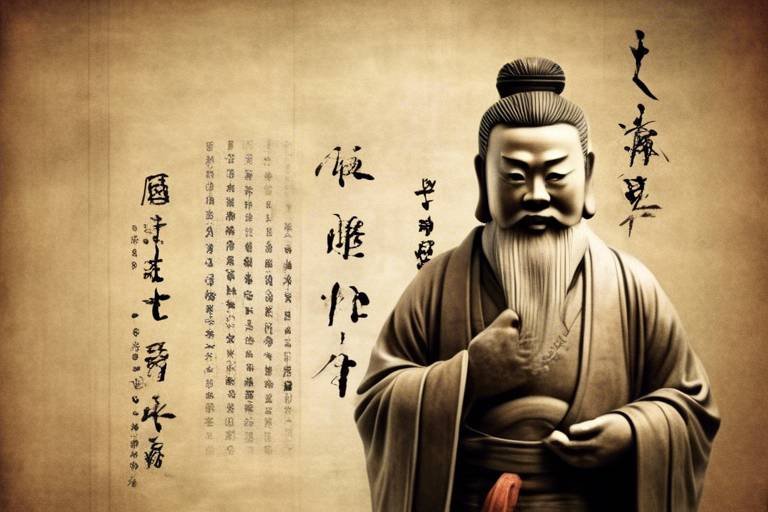Understanding Chinese Philosophy: An Introductory Overview
Chinese philosophy is a vast and intricate tapestry woven over thousands of years, reflecting the profound thoughts and cultural nuances of one of the world's oldest civilizations. At its core, it seeks to answer fundamental questions about existence, morality, and the nature of reality. Imagine standing at the crossroads of various philosophies, each offering a unique lens through which to view life. This article aims to provide a foundational understanding of these rich traditions, exploring key concepts, historical developments, and the major thinkers who have shaped the evolution of Chinese philosophy.
Throughout history, Chinese philosophy has been influenced by a myriad of factors, from the political upheavals of dynastic changes to the everyday struggles of common people. It's like a river, constantly flowing and adapting to the landscape around it. As we delve deeper, we'll uncover how various schools of thought emerged, each contributing to the philosophical dialogue that continues to this day. Whether it's the ethical teachings of Confucianism, the naturalistic insights of Daoism, or the pragmatic approaches of Legalism, each school offers a distinct perspective that resonates with the complexities of human life.
In this journey through Chinese philosophy, we will not only highlight the historical context but also examine the core tenets that define each philosophical school. Think of it as peeling back the layers of an onion; each layer reveals more about the fundamental beliefs that guide individuals and societies. From the emphasis on relationships and moral integrity in Confucianism to the celebration of harmony with nature in Daoism, these ideas have shaped not only Chinese culture but have also found relevance in contemporary discussions on ethics and governance.
As we explore the major thinkers who laid the groundwork for these philosophies, we’ll encounter figures like Confucius, Laozi, and Zhuangzi, whose teachings have left an indelible mark on both Eastern and Western thought. Their ideas challenge us to reflect on our own values and the way we interact with the world around us. So, buckle up as we embark on this enlightening exploration of Chinese philosophy, a journey that promises to enrich our understanding of ourselves and the universe.
- What is the main focus of Chinese philosophy?
Chinese philosophy primarily focuses on ethics, governance, and the nature of reality, emphasizing harmony, relationships, and moral integrity. - Who are the most influential philosophers in Chinese history?
Some of the most notable philosophers include Confucius, Laozi, and Zhuangzi, each contributing significantly to various philosophical schools. - How does Chinese philosophy apply to modern life?
Many principles of Chinese philosophy, such as those found in Confucianism and Daoism, are relevant in contemporary discussions on ethics, leadership, and personal well-being. - Is Chinese philosophy still relevant today?
Yes, the ideas and teachings of Chinese philosophy continue to resonate globally, influencing various fields including politics, education, and environmentalism.

Historical Context of Chinese Philosophy
Understanding the historical context of Chinese philosophy is like peeling back the layers of an onion; each layer reveals the intricate tapestry of cultural, political, and social influences that have shaped its evolution over millennia. Chinese philosophy didn't just spring up overnight; it was born out of a rich historical backdrop marked by dynastic changes, wars, and the quest for knowledge. From the ancient Zhou Dynasty, which laid the groundwork for philosophical thought, to the tumultuous times of the Warring States, each era brought forth new ideas that were as diverse as the people who lived through them.
During the early periods, the Chinese were grappling with questions about morality, governance, and the nature of the universe. Think of it as a philosophical buffet where different schools of thought emerged, each offering unique dishes to satisfy the intellectual appetites of the time. Confucianism, with its focus on ethics and social harmony, rose to prominence during the Han Dynasty, while Daoism emerged as a counterpoint, advocating for a more natural and spontaneous approach to life. This interplay between various philosophies highlights how they were not isolated but rather interacted and influenced each other.
Moreover, the political landscape played a significant role in shaping these philosophies. For instance, the rise of Legalism during the Qin Dynasty reflected the need for strict laws and order in a time of chaos. It’s fascinating to see how the philosophies were responses to the challenges of their times, almost like a philosophical reflex to societal needs. The table below summarizes the major dynasties and their corresponding philosophical developments:
| Dynasty | Philosophical Development |
|---|---|
| Zhou | Foundation of Confucianism and Daoism |
| Qin | Rise of Legalism |
| Han | Confucianism becomes state philosophy |
| Tang | Integration of Buddhism with Chinese thought |
As we delve deeper into the historical context, it's essential to recognize the role of cultural exchange. The Silk Road, for example, wasn't just a trade route for goods; it was a conduit for ideas. Philosophers and scholars traveled along these paths, sharing thoughts and enriching each other's cultures. This cross-pollination of ideas helped to shape a more comprehensive understanding of the world, blending Eastern and Western philosophies in ways that are still relevant today.
In conclusion, the historical context of Chinese philosophy is not just a backdrop; it's a dynamic interplay of ideas, cultures, and societal needs. Each philosophical school emerged as a response to the world around it, reflecting the complexities of human thought and experience. As we move forward in this exploration of Chinese philosophy, keep in mind that these ideas are not just relics of the past but living concepts that continue to influence our lives today.

Key Philosophical Schools
Chinese philosophy is a tapestry woven from various threads of thought, each contributing its unique patterns and colors to the rich philosophical landscape. Among these, three schools stand out prominently: Confucianism, Daoism, and Legalism. Each school offers profound insights into ethics, governance, and the nature of reality, shaping not only Chinese society but also influencing global philosophical discourse.
At the heart of Confucianism lies the belief in moral integrity and the importance of social harmony. Founded by the esteemed thinker Confucius, this school emphasizes the significance of relationships and the cultivation of virtues such as Ren (benevolence) and Li (ritual propriety). Confucianism has profoundly impacted Chinese culture, instilling values that prioritize familial respect and social responsibility.
In contrast, Daoism, also known as Taoism, invites individuals to embrace the natural flow of life. It teaches that by aligning oneself with the Dao (the Way), one can achieve a state of harmony and balance. This school encourages simplicity, spontaneity, and a deep connection with nature, offering a refreshing perspective in a world often dominated by rigid structures and expectations.
Legalism, on the other hand, presents a more pragmatic approach to governance. It advocates for strict laws and harsh punishments as necessary means to maintain order and control within society. While it may seem harsh compared to the ideals of Confucianism and Daoism, Legalism played a crucial role in the unification of China under the Qin Dynasty, highlighting the diverse strategies for governance and social organization that Chinese philosophy encompasses.
These three schools—Confucianism, Daoism, and Legalism—represent the foundational pillars of Chinese philosophical thought. Each offers distinct perspectives that address fundamental questions about ethics, governance, and the human experience. Their teachings continue to resonate, providing valuable insights into the complexities of life, relationships, and society.
As we delve deeper into these philosophies, it becomes evident that they are not merely ancient doctrines but living traditions that continue to influence contemporary thought and practice. The interplay among these schools fosters a rich dialogue that invites us to reflect on our values and the world around us.
- What is Confucianism? Confucianism is a philosophical system that emphasizes moral integrity, social harmony, and the importance of relationships, founded by Confucius.
- How does Daoism differ from Confucianism? Daoism focuses on living in harmony with the Dao (the Way) and promotes simplicity and spontaneity, while Confucianism emphasizes ethical behavior and social responsibilities.
- What role did Legalism play in Chinese history? Legalism played a crucial role in the unification of China, advocating for strict laws and governance to maintain order during the Qin Dynasty.
- Can these philosophies be applied today? Yes, the principles of these philosophical schools continue to influence modern thought, ethics, and practices in various fields.

Confucianism
Confucianism is not just a set of beliefs; it is a vibrant tapestry woven into the very fabric of Chinese culture and society. Founded by Confucius in the 5th century BCE, this philosophy emphasizes the importance of moral integrity, social harmony, and the significance of human relationships. Imagine a world where respect, empathy, and ethical conduct are the cornerstones of every interaction—this is the essence of Confucian thought. At its heart, Confucianism advocates for a society where individuals strive for personal excellence and contribute to the greater good, fostering a sense of community and belonging.
One of the most compelling aspects of Confucianism is its focus on the five key relationships that govern social interactions. These relationships are:
- Ruler and subject
- Father and son
- Husband and wife
- Older brother and younger brother
- Friend and friend
Each relationship carries its own set of responsibilities and expectations, emphasizing that harmony is achieved when everyone fulfills their roles with sincerity and respect. For instance, the father is expected to provide for his family and guide his children, while the son should honor and respect his father. This reciprocity fosters a sense of stability and trust within society.
At the core of Confucianism are two pivotal concepts: Ren and Li. Ren, often translated as "benevolence" or "humaneness," is the ideal of compassion and empathy toward others. It encourages individuals to cultivate kindness and to act with integrity. On the other hand, Li refers to "ritual propriety," which encompasses the norms and customs that govern behavior. It is through Li that individuals learn to express Ren in their daily lives, creating a structured environment where respect and decorum prevail.
Confucius himself was a remarkable thinker and educator whose teachings have left a lasting legacy. His emphasis on education and self-improvement inspired generations to pursue knowledge and virtue. In fact, he believed that a well-educated individual could bring about positive change in society. This belief is beautifully captured in the saying, "To be wrong is nothing, unless you remember it afterward." Confucius encouraged his followers to learn from their mistakes and strive for continual growth.
Moreover, Confucianism has shaped not only personal ethics but also the political landscape of China. The philosophy promotes a government led by virtuous rulers who prioritize the welfare of their people. This idea of governance echoes through centuries of Chinese history, influencing dynasties and political thought. Even today, the principles of Confucianism can be seen in various aspects of Chinese society, from family structures to educational systems.
In conclusion, Confucianism is more than a historical philosophy; it is a living, breathing entity that continues to influence millions. Its teachings on morality, social harmony, and the importance of relationships resonate deeply in modern society, reminding us that the pursuit of virtue and ethical conduct is timeless. As we navigate the complexities of our contemporary world, the wisdom of Confucius offers a guiding light, encouraging us to cultivate compassion and integrity in our daily lives.
- What is the main focus of Confucianism? Confucianism primarily focuses on moral integrity, social harmony, and the importance of human relationships.
- Who was Confucius? Confucius was a Chinese philosopher and educator whose teachings laid the foundation for Confucianism.
- How does Confucianism influence modern society? Confucian principles continue to impact family structures, education, and governance in contemporary society.

Core Concepts of Confucianism
Confucianism, a philosophical system founded by Confucius, is built on several core concepts that serve as guiding principles for personal conduct and societal harmony. At the heart of Confucian thought lies Ren, often translated as benevolence or humaneness. This concept emphasizes the importance of compassion, kindness, and empathy towards others. Imagine a world where everyone acts with Ren; conflicts would diminish, and relationships would flourish, creating a society grounded in mutual respect.
Another essential concept is Li, which refers to ritual propriety and the proper way of doing things. It encompasses not just external rituals but also the internal attitudes that accompany them. Li teaches us that our actions should reflect our respect for others and the social order, reinforcing the idea that how we conduct ourselves in everyday interactions matters deeply. Think of Li as the glue that holds society together; without it, chaos would reign.
In addition to Ren and Li, the idea of Xiao or filial piety plays a crucial role in Confucian ethics. Filial piety stresses the importance of respecting and honoring one’s parents and ancestors. In a culture where family bonds are paramount, Xiao serves as a reminder of our responsibilities to our elders and the legacy we inherit. This concept is not merely about obedience but about fostering a deep sense of gratitude and duty towards those who came before us.
These core concepts are interwoven, creating a rich tapestry of ethical guidance that shapes individual behavior and societal norms. Confucianism teaches that by cultivating virtues like Ren, practicing Li, and honoring Xiao, individuals contribute to a harmonious society. This philosophy encourages self-reflection and personal growth, urging individuals to strive for moral excellence.
In summary, the core concepts of Confucianism—Ren, Li, and Xiao—form a robust framework for understanding ethics and morality in Chinese culture. They remind us that our actions have a ripple effect on those around us, and by embodying these principles, we can create a more compassionate and harmonious world.
- What is the main idea of Confucianism?
Confucianism focuses on the importance of moral integrity, social harmony, and the cultivation of virtues such as benevolence and respect. - How does Confucianism impact modern society?
Confucian principles continue to influence contemporary values, particularly in areas related to family, education, and governance. - What are the key differences between Confucianism and Daoism?
While Confucianism emphasizes social order and moral conduct, Daoism focuses on harmony with nature and the importance of spontaneity.

Confucius and His Influence
Confucius, known as Kong Fuzi in Mandarin, is often regarded as one of the most influential figures in Chinese history. Born in 551 BCE during the tumultuous Spring and Autumn period, his teachings emerged as a beacon of hope in a society riddled with chaos and moral decay. Confucius sought to restore social harmony through a series of ethical principles that emphasized the importance of virtue, respect, and responsibility. His ideas were not merely theoretical; they offered practical solutions to the societal issues of his time, advocating for a return to moral integrity and proper conduct.
One of the most significant aspects of Confucius's influence lies in his emphasis on relationships. He believed that the foundation of a stable society rested on the moral integrity of its individuals, especially within familial and social relationships. This concept is encapsulated in the principle of Ren (benevolence or humaneness), which encourages individuals to act with kindness and empathy towards others. In this way, Confucius laid the groundwork for a society that values interpersonal connections and mutual respect.
Moreover, Confucius's teachings extended beyond personal ethics; they infiltrated the very fabric of Chinese political structure. His ideas on governance advocated for rulers to embody virtue and moral leadership, a stark contrast to the often tyrannical regimes of his time. This led to the establishment of a meritocratic system where officials were chosen based on their moral character and ability to govern wisely, rather than through birthright or wealth. This shift not only shaped the political landscape of ancient China but also influenced the governance models of many subsequent dynasties.
Confucius's legacy is also evident in the educational reforms he championed. He was a firm believer in the transformative power of education, arguing that learning should be accessible to all, regardless of social class. This belief laid the foundation for a more educated populace, capable of contributing to society in meaningful ways. His methods of teaching emphasized critical thinking and moral instruction, which are still relevant in educational practices today.
To illustrate the profound impact of Confucius, consider the following table that highlights his core teachings and their lasting influence:
| Core Teaching | Influence |
|---|---|
| Ren (Benevolence) | Promotes empathy and compassion in personal and societal interactions. |
| Li (Ritual Propriety) | Encourages respect for tradition and social order, fostering harmony. |
| Filial Piety | Emphasizes respect for parents and ancestors, strengthening family bonds. |
| Moral Leadership | Influences political philosophy and governance, advocating for virtuous rulers. |
| Education for All | Encourages a more informed and capable citizenry, promoting social mobility. |
In conclusion, the teachings of Confucius have transcended time and geography, continuing to resonate in contemporary society. His emphasis on ethics, education, and moral leadership has shaped not only Chinese culture but also influenced global thought. Today, as we navigate our own complexities, the wisdom of Confucius serves as a reminder that the path to a harmonious society lies in our ability to treat each other with respect and kindness.
- What is the main focus of Confucianism? Confucianism primarily emphasizes moral integrity, social harmony, and the importance of relationships.
- How did Confucius influence education? Confucius advocated for accessible education for all, promoting critical thinking and moral instruction.
- What is Ren in Confucian thought? Ren refers to benevolence or humaneness, encouraging individuals to act with kindness towards others.
- How does Confucianism impact modern society? Confucian principles continue to influence contemporary ethics, governance, and interpersonal relationships.

Daoism
Daoism, also known as Taoism, invites us to explore a profound and often mystical approach to life. At its core, it emphasizes living in harmony with the Dao (or Tao), which can be understood as the fundamental principle that underlies and unites all things in the universe. Imagine the Dao as a flowing river, guiding us effortlessly along the path of existence. Instead of fighting against the current, Daoism teaches us to embrace simplicity, spontaneity, and a deep connection with nature.
One of the remarkable aspects of Daoism is its rejection of rigid structures and dogmas. It encourages individuals to seek their own path and cultivate a sense of inner peace. This philosophy resonates with many people today, as it offers an alternative to the fast-paced, often chaotic modern world. By aligning ourselves with the Dao, we can find balance and tranquility amidst the noise of daily life.
Central to Daoist thought is the concept of wu wei, which translates to "non-action" or "effortless action." This does not imply laziness or passivity; rather, it suggests a state of being where one acts in accordance with the natural flow of events. Think of it as dancing with the rhythm of life rather than trying to impose your will upon it. This principle encourages us to let go of excessive control and trust in the unfolding of life.
Daoism also emphasizes the importance of nature. The natural world is seen as a reflection of the Dao, and by observing its cycles and rhythms, we can gain insights into our own lives. For instance, the changing seasons remind us of the impermanence of life and the necessity of adapting to change. In this way, Daoism fosters a deep respect for the environment, encouraging sustainable living practices that honor the interconnectedness of all beings.
Moreover, Daoism provides a rich tapestry of practices aimed at cultivating harmony within oneself and with the world. These include meditation, tai chi, and traditional Chinese medicine, all of which promote physical and mental well-being. By engaging in these practices, individuals can enhance their connection to the Dao, fostering a sense of inner peace and balance.
In summary, Daoism offers a unique perspective on existence, urging us to embrace simplicity and harmony in our lives. Its teachings remind us that by aligning ourselves with the natural flow of the universe, we can cultivate a deeper understanding of ourselves and our place within the cosmos. As we navigate the complexities of modern life, the wisdom of Daoism continues to inspire and guide us towards a more fulfilling existence.
- What is the main goal of Daoism? The main goal of Daoism is to live in harmony with the Dao, embracing simplicity and spontaneity while cultivating inner peace.
- How does Daoism view nature? Daoism sees nature as a reflection of the Dao, emphasizing the importance of respecting and learning from the natural world.
- What is wu wei? Wu wei is a key concept in Daoism that means "non-action" or "effortless action," encouraging individuals to act in accordance with the natural flow of events.
- Can Daoism be practiced alongside other philosophies? Yes, many people find value in incorporating Daoist principles alongside other philosophical or spiritual beliefs.

Major Thinkers in Chinese Philosophy
When diving into the rich tapestry of Chinese philosophy, it's impossible to overlook the profound contributions of its major thinkers. These intellectual giants not only shaped the philosophical landscape of their time but also laid down ideas that continue to resonate through the ages. Among them, figures like Laozi, Zhuangzi, and Mozi stand out, each offering unique perspectives that challenge and enrich our understanding of ethics, governance, and the nature of existence.
Laozi, often regarded as the father of Daoism, authored the Dao De Jing, a text that serves as the cornerstone of Daoist thought. His teachings emphasize the importance of living in harmony with the Dao (the Way), advocating for simplicity and a deep connection with nature. Laozi's wisdom encourages individuals to embrace spontaneity and to align their lives with the natural flow of the universe, leading to a more fulfilling existence.
Next on this philosophical journey is Zhuangzi, a thinker who took Laozi's ideas and expanded upon them. Through his writings, Zhuangzi introduced the concept of the relativity of human experiences and perceptions. He famously illustrated this idea with the tale of a butterfly dreaming it was a man, prompting us to question the very nature of reality and identity. His emphasis on embracing spontaneity and the importance of freedom resonates deeply, urging us to break free from societal constraints and live authentically.
Another significant figure is Mozi, known for his advocacy of utilitarianism and the idea of universal love. In stark contrast to Confucian ideals, which prioritize familial loyalty, Mozi argued for a more egalitarian approach to ethics. He believed that love should be extended to all individuals, regardless of their relationship to us. This radical notion challenged the status quo and introduced a new dimension to ethical considerations within Chinese thought.
To better understand the contributions of these thinkers, we can summarize their core philosophies in the following table:
| Thinker | Key Contributions | Philosophical Focus |
|---|---|---|
| Laozi | Dao De Jing, principles of Daoism | Harmony with nature, simplicity, spontaneity |
| Zhuangzi | Emphasis on relativity and freedom | Spontaneity, questioning reality |
| Mozi | Universal love, utilitarian ethics | Equality, social welfare |
These major thinkers not only shaped the philosophical discourse of their time but also set the stage for future generations to explore and expand upon their ideas. Their legacies remind us that philosophy is not merely an academic pursuit; it is a living dialogue that continues to evolve and inspire. As we reflect on their teachings, we find valuable insights that can guide us in navigating the complexities of modern life.
- Who is considered the father of Daoism? Laozi is widely regarded as the father of Daoism, having authored the foundational text, the Dao De Jing.
- What is the main idea behind Zhuangzi's philosophy? Zhuangzi emphasized the relativity of human experiences and the importance of living spontaneously and authentically.
- How does Mozi's philosophy differ from Confucianism? Mozi advocated for universal love and utilitarianism, contrasting with Confucianism's focus on familial loyalty and social hierarchy.

Laozi and the Dao De Jing
Laozi, often regarded as the founder of Daoism, is a pivotal figure in Chinese philosophy whose teachings have transcended time and culture. His most renowned work, the Dao De Jing, serves as a foundational text that encapsulates the essence of Daoist thought. Written in a poetic style, this text comprises 81 chapters, each filled with profound insights on the nature of existence, the universe, and the art of living harmoniously. But what makes the Dao De Jing so special? It's not just a philosophical treatise; it's a guide to navigating the complexities of life.
One of the central themes of the Dao De Jing is the concept of the Dao (or "the Way"), which represents the fundamental principle that underlies and unites all things in the universe. Laozi emphasizes that the Dao is not something that can be fully understood or articulated; rather, it is to be experienced. He famously states, "The Dao that can be told is not the eternal Dao," highlighting the limitations of language and human understanding. This idea invites readers to embrace a sense of mystery and wonder in their lives, encouraging them to seek harmony with the natural world rather than imposing their will upon it.
The Dao De Jing also introduces the idea of wu wei, which translates to "non-action" or "effortless action." This principle does not advocate for passivity; instead, it encourages individuals to align their actions with the flow of the universe. By practicing wu wei, one can achieve more by doing less, allowing things to unfold naturally. This concept can be likened to a river flowing around obstacles rather than forcing its way through them. It's a powerful reminder that sometimes, the best course of action is to step back and let life take its course.
Laozi's teachings extend beyond individual spirituality; they also offer insights into governance and leadership. He posits that a wise ruler should embody humility and simplicity, leading by example rather than through force. In this way, the Dao De Jing provides a blueprint for effective leadership, emphasizing that true power lies not in domination but in fostering trust and collaboration among people. This approach resonates deeply in today's world, where many seek authentic leadership that prioritizes the well-being of the community.
The influence of Laozi and the Dao De Jing is evident not only in Chinese culture but also in various aspects of global thought. Concepts of balance, harmony, and respect for nature are increasingly relevant as societies grapple with modern challenges such as environmental degradation and social discord. As we navigate the complexities of contemporary life, the wisdom of Laozi serves as a beacon, reminding us of the importance of living in alignment with the world around us.
- Who was Laozi? Laozi is an ancient Chinese philosopher credited with founding Daoism and authoring the Dao De Jing.
- What is the Dao De Jing? The Dao De Jing is a fundamental text of Daoism, consisting of poetic verses that explore the nature of the Dao and principles of living harmoniously.
- What does "wu wei" mean? Wu wei translates to "non-action" or "effortless action," encouraging individuals to align their actions with the natural flow of the universe.
- How does Laozi's philosophy apply to modern life? Laozi's teachings on balance, humility, and harmony can guide individuals in personal development, leadership, and environmental stewardship.

Zhuangzi's Philosophical Contributions
Zhuangzi, a pivotal figure in Daoism, expanded upon the ideas set forth by Laozi, offering a unique lens through which to view the world. His writings, particularly the Zhuangzi text, are filled with parables, anecdotes, and philosophical musings that challenge the rigidity of conventional thought. One of his most notable contributions is the concept of relativity, where he posits that human perceptions are inherently subjective and that what is true for one may not hold for another. This idea encourages a sense of openness and adaptability, urging individuals to embrace the complexities of life rather than resist them.
In his work, Zhuangzi often employs humor and paradox to illustrate his points. For instance, he tells the story of a giant fish transforming into a bird, symbolizing the fluidity of existence and the potential for change. This narrative serves as a reminder that life is not a straight path but rather a series of transformations, much like the seasons. Zhuangzi's philosophy invites us to question the very nature of reality, suggesting that our understanding is limited by our experiences and societal constructs.
Another significant aspect of Zhuangzi's thought is the idea of wu wei, or "non-action." This does not imply laziness or inaction but rather a harmonious way of living that aligns with the natural flow of the universe. Zhuangzi advocates for a lifestyle that embraces spontaneity, allowing individuals to act in accordance with their true nature rather than being bound by societal expectations. This principle encourages a sense of freedom, suggesting that by letting go of rigid ambitions and desires, one can achieve a state of inner peace and fulfillment.
To illustrate his philosophy, Zhuangzi often contrasts the life of a wise person with that of a conventional individual. He argues that the wise person is like a flowing river, adapting to the contours of the landscape, while the conventional person is like a rigid structure, unable to bend or change. This metaphor highlights the importance of flexibility and adaptability in navigating life's challenges.
Ultimately, Zhuangzi's contributions extend beyond mere philosophical musings; they offer practical insights into how we can live our lives. By embracing relativity, practicing wu wei, and cultivating a sense of spontaneity, we can foster a deeper connection with ourselves and the world around us. His teachings resonate with those seeking to find meaning in a world that often feels chaotic and unpredictable.
- Who was Zhuangzi?
Zhuangzi was an influential Daoist philosopher known for his writings that explore the nature of reality and human perception. - What is the main idea of Zhuangzi's philosophy?
Zhuangzi emphasized the relativity of human concepts and advocated for a lifestyle of spontaneity and harmony with the natural world. - What does "wu wei" mean?
"Wu wei" translates to "non-action" and refers to a way of living that aligns with the natural flow of the universe, encouraging individuals to act without force or struggle. - How does Zhuangzi's thought apply to modern life?
Zhuangzi's ideas encourage flexibility, adaptability, and a deeper understanding of oneself, which can help individuals navigate the complexities of contemporary life.

Ethics and Morality in Chinese Philosophy
When diving into the rich tapestry of Chinese philosophy, one cannot overlook the profound emphasis placed on ethics and morality. These concepts are not merely abstract ideas; they are the very fabric that weaves together the social, cultural, and personal dimensions of life in China. At the heart of this philosophical exploration lies the quest for harmony, respect, and a deep-rooted sense of duty towards others. The ethical frameworks established by various schools of thought, particularly Confucianism and Daoism, guide individuals in their interactions and decisions, shaping a society that values collective well-being over individual desires.
In Confucianism, ethics is deeply intertwined with the concept of Ren (benevolence) and Li (ritual propriety). These principles advocate for a life lived in accordance with moral integrity and social harmony. Confucius, the great sage, believed that a well-ordered society stems from individuals who cultivate personal virtues and respect for familial and societal roles. This leads us to the concept of filial piety, which is paramount in Confucian ethics. It emphasizes the importance of honoring one’s parents and ancestors, creating a chain of respect that extends through generations. In this way, ethics becomes not just a personal matter but a societal obligation.
On the other hand, Daoism offers a contrasting yet complementary perspective on ethics. In Daoist thought, morality is less about strict adherence to rules and more about aligning oneself with the natural order of the universe, known as the Dao (the Way). Here, virtues such as humility, compassion, and non-action (Wu Wei) play a critical role. Daoists believe that by embracing simplicity and spontaneity, individuals can live harmoniously with the world around them. This philosophy encourages a lifestyle that respects the rhythms of nature and promotes a sense of peace and balance.
To illustrate the differences and similarities between the ethical frameworks of Confucianism and Daoism, consider the following table:
| Aspect | Confucianism | Daoism |
|---|---|---|
| Focus | Moral integrity and social harmony | Alignment with the natural order |
| Key Virtues | Ren (benevolence), Li (propriety) | Humility, compassion, Wu Wei (non-action) |
| Relationship with Society | Emphasizes duty and respect for hierarchy | Encourages spontaneity and individual freedom |
As we can see, while Confucianism and Daoism present different approaches to ethics, both share a common goal: to foster a sense of harmony within oneself and with the world. This duality enriches the ethical landscape of Chinese philosophy, allowing individuals to choose paths that resonate with their personal beliefs and life situations.
The implications of these ethical teachings extend beyond individual conduct; they shape societal norms and influence governance. In modern China, the echoes of these ancient philosophies can still be felt in various aspects of life, from family dynamics to business practices. For instance, the emphasis on respect and duty in Confucianism has influenced the way businesses operate, promoting a culture of trust and long-term relationships.
In conclusion, the exploration of ethics and morality in Chinese philosophy reveals a complex interplay between individual virtues and societal values. Whether through the lens of Confucianism's structured approach or Daoism's fluidity, the pursuit of ethical living remains a vital aspect of human experience, guiding individuals towards a more harmonious existence.
- What is the main difference between Confucianism and Daoism? Confucianism focuses on moral integrity and social harmony, while Daoism emphasizes living in accordance with the natural order and embracing spontaneity.
- Why is filial piety important in Chinese culture? Filial piety underscores the importance of respecting and honoring one’s parents and ancestors, forming the foundation of family and societal relationships.
- How do Chinese philosophical teachings influence modern society? The principles of Chinese philosophy continue to shape contemporary practices in areas such as ethics, governance, and personal relationships.

Filial Piety in Confucian Ethics
Filial piety, or xiaojing (孝敬), is a cornerstone of Confucian ethics that embodies the deep respect and devotion one should have towards their parents and ancestors. This concept is not merely about obedience; it encompasses a broader spectrum of values including love, honor, and gratitude. In essence, filial piety is about recognizing the sacrifices made by previous generations and ensuring that their legacy is upheld in the present. It serves as a guiding principle for interpersonal relationships within families and society at large, shaping moral conduct and social harmony.
One of the fascinating aspects of filial piety is how it intertwines with various elements of Chinese culture. For instance, it influences family structures, social hierarchies, and even governmental policies. In traditional Chinese society, the family unit is often viewed as the fundamental building block of social order. This is where filial piety plays a crucial role: it encourages individuals to prioritize family obligations over personal desires, fostering a sense of community and collective responsibility.
Moreover, filial piety manifests in different forms, such as:
- Respecting Parents: This involves honoring their wishes, listening to their advice, and showing them love and support.
- Care for Elders: Providing for aging parents financially and emotionally is seen as a duty, reflecting the deep-seated belief that one must return the care they received as children.
- Honoring Ancestors: Rituals and ceremonies are performed to pay respect to ancestors, ensuring their memory and teachings live on.
Confucius himself emphasized the importance of filial piety in his teachings, often stating that one cannot truly cultivate virtue without first practicing respect for their parents. He believed that this respect is the foundation upon which all other ethical behaviors are built. The teachings of Confucius have permeated Chinese culture for centuries, shaping not only personal relationships but also the broader societal norms. In fact, many of the principles of governance in ancient China were derived from the idea of filial piety, suggesting that a ruler should act as a benevolent parent to their subjects.
In modern times, while the concept of filial piety remains significant, it faces challenges due to urbanization and changing societal norms. Young people today often grapple with the balance between traditional expectations and contemporary lifestyles. Nevertheless, the essence of filial piety continues to influence family dynamics and ethical considerations in various aspects of life.
In conclusion, filial piety is more than just a duty; it is a profound expression of love and respect that resonates through generations. It serves as a reminder of the interconnectedness of family and society, urging individuals to cherish their roots while navigating the complexities of modern life.
- What is the significance of filial piety in Chinese culture?
Filial piety is significant as it promotes respect and care for one's parents and ancestors, forming the basis of moral conduct and social harmony. - How does filial piety influence modern Chinese society?
While traditional views of filial piety still hold value, modern challenges such as urbanization are reshaping how it is practiced among younger generations. - Are there rituals associated with filial piety?
Yes, rituals such as ancestor worship and family gatherings are common practices that honor and respect one's lineage.

The Role of Virtue in Daoism
In the intricate tapestry of Daoism, virtue plays a pivotal role, acting as the compass that guides individuals toward a life of harmony and balance. Unlike many Western philosophies that often emphasize strict ethical codes, Daoism invites us to embrace a more fluid understanding of virtue, one that aligns with the natural rhythms of the universe. Imagine standing by a serene river, where the water flows effortlessly around the rocks; this imagery encapsulates the Daoist view of virtue—it's about flowing with life rather than forcing it.
At the heart of Daoist virtue lies the principle of wu wei, which translates to "non-action" or "effortless action." This doesn't imply laziness or passivity but rather encourages individuals to act in accordance with the natural order of things. When one practices wu wei, they are not struggling against the currents of life but instead moving with them, allowing for a more harmonious existence. This approach fosters virtues such as humility, compassion, and moderation, which are essential for personal and communal well-being.
Moreover, Daoism teaches that virtue is not a rigid set of rules but a dynamic quality that can manifest in various forms depending on the situation. For instance, kindness in one moment may require assertiveness in another. This adaptability is crucial, as it reflects the Daoist belief in the relativity of human concepts. Virtue, therefore, becomes a personal journey, where individuals cultivate their moral compass through introspection and connection with the Dao.
In essence, the Daoist perspective on virtue encourages individuals to:
- Embrace spontaneity and flexibility in their actions.
- Recognize the interconnectedness of all things, fostering a sense of compassion and empathy.
- Seek balance in their lives, aligning their actions with the natural order.
Ultimately, the role of virtue in Daoism is about finding one's place within the cosmos and acting in a way that promotes harmony, both within oneself and in relation to the world. This philosophy invites us to reflect on our actions and their impacts, urging us to cultivate virtues that resonate with the essence of the Dao. By doing so, we not only enrich our own lives but also contribute to the collective well-being of society.
1. What is the main focus of Daoist virtue?
Daoist virtue primarily emphasizes living in harmony with the Dao, promoting qualities like humility, compassion, and non-action.
2. How does wu wei relate to virtue in Daoism?
Wu wei, or "non-action," encourages individuals to act effortlessly in accordance with nature, embodying the essence of virtue without forcing outcomes.
3. Can virtues in Daoism change based on circumstances?
Yes, Daoism teaches that virtues are dynamic and can manifest differently depending on the context, emphasizing adaptability and relativity.
4. How can one cultivate Daoist virtues in daily life?
Cultivating Daoist virtues involves introspection, embracing spontaneity, and seeking balance in actions, all while being mindful of the interconnectedness of life.

Modern Relevance of Chinese Philosophy
In today's fast-paced world, where chaos often reigns, the principles of Chinese philosophy serve as a beacon of wisdom and guidance. These ancient teachings, rooted in the rich cultural tapestry of China, continue to resonate with contemporary society, influencing various aspects of our lives. You might wonder, "How can ideas that are thousands of years old still hold value?" Well, the answer lies in their timeless nature and adaptability.
One of the most significant impacts of Chinese philosophy today is its role in shaping ethical frameworks. For instance, the concept of harmony—a core tenet of both Confucianism and Daoism—encourages individuals and communities to seek balance in their relationships and interactions. This principle is incredibly relevant in our globalized society, where cultural exchanges and interactions are commonplace. By promoting understanding and respect, these philosophies help mitigate conflicts and foster collaboration across cultural boundaries.
Moreover, the emphasis on filial piety in Confucian ethics highlights the importance of family values and respect for elders, which resonate deeply in many cultures today. This value encourages individuals to honor their family ties and responsibilities, creating a sense of community and support that is essential in an increasingly individualistic world. It’s a reminder that amidst our personal ambitions, we should not forget the roots that ground us.
As we navigate the complexities of modern life, the Daoist notion of wu wei, or "non-action," encourages us to embrace simplicity and spontaneity. In a world overflowing with information and choices, this philosophy teaches us to step back, breathe, and allow life to unfold naturally. It’s akin to standing at the edge of a river and letting the current guide you, rather than fighting against it. This perspective can help reduce stress and promote mental well-being, making it an invaluable tool for personal development.
In practical terms, the teachings of Chinese philosophy find applications in various fields today. For example, in the realm of leadership, the ethical principles derived from Confucianism are increasingly being integrated into modern management practices. Leaders who embody virtues such as integrity, respect, and benevolence foster workplace environments that prioritize collaboration and innovation. This approach not only enhances productivity but also creates a more fulfilling work culture.
Furthermore, as environmental issues take center stage globally, the Daoist principle of living in harmony with nature is more relevant than ever. It advocates for sustainable practices and a deep connection to the earth, urging us to consider our impact on the environment. This philosophy encourages individuals and organizations to adopt eco-friendly practices, promoting a healthier planet for future generations.
To illustrate the modern relevance of Chinese philosophy, consider the following table that summarizes its key contributions to various contemporary fields:
| Field | Chinese Philosophical Concept | Application |
|---|---|---|
| Ethics | Filial Piety | Promotes family values and respect for elders |
| Leadership | Confucian Virtues | Encourages integrity and benevolence in management |
| Environmentalism | Daoist Harmony with Nature | Advocates for sustainable practices |
| Mental Well-being | Wu Wei (Non-action) | Encourages stress reduction through simplicity |
As we continue to explore the depths of Chinese philosophy, it becomes clear that its teachings are not just relics of the past but living ideas that can guide us through the challenges of modern life. By integrating these principles into our daily routines, we can cultivate a more harmonious existence, both individually and collectively.
- What is the main focus of Chinese philosophy? Chinese philosophy primarily focuses on ethics, governance, and the nature of reality, with key themes around harmony, relationships, and moral integrity.
- How does Confucianism influence modern society? Confucianism influences modern society through its emphasis on family values, respect for elders, and ethical leadership, promoting social harmony and responsibility.
- What role does Daoism play in contemporary environmentalism? Daoism plays a significant role in contemporary environmentalism by advocating for a harmonious relationship with nature and promoting sustainable practices.
- Can Chinese philosophy help with personal development? Yes, Chinese philosophy offers valuable insights into personal development, encouraging simplicity, balance, and ethical living, which can enhance overall well-being.

Chinese Philosophy in Global Context
In today's interconnected world, the resonance of Chinese philosophy extends far beyond the borders of its origin. As globalization continues to weave diverse cultures together, the ideas stemming from ancient Chinese thinkers are finding their place in the global philosophical landscape. This is not just a resurgence of interest but a profound recognition of the wisdom that these philosophies offer in addressing contemporary issues.
One of the most compelling aspects of Chinese philosophy is its emphasis on harmony and balance, principles that are crucial in our increasingly chaotic world. For instance, the concept of Dao (the Way) encourages individuals and societies to seek equilibrium, which can be applied to various fields such as environmental sustainability, conflict resolution, and interpersonal relationships. As nations grapple with climate change, the Daoist principle of living in harmony with nature provides a refreshing perspective that resonates with modern environmental movements.
Moreover, the ethical frameworks established by philosophers like Confucius and Laozi offer valuable insights into governance and leadership. In a time when political polarization is rampant, the emphasis on moral integrity, respect, and community welfare found in Confucianism can inspire leaders to prioritize the common good over personal gain. This has led to a growing interest in Eastern philosophies within Western educational systems, where they are increasingly integrated into curricula to foster a more holistic understanding of ethics and morality.
As we explore the global context of Chinese philosophy, it’s evident that these ideas are not only applicable but also transformative. They encourage a shift from individualism to a more collective consciousness, promoting a sense of responsibility towards others and the environment. For instance, the practice of filial piety extends beyond family relationships, urging individuals to honor their communities and the planet, creating a ripple effect of positive change.
Furthermore, the increasing interest in mindfulness and well-being, which has roots in Daoist practices, is gaining traction worldwide. Concepts such as meditation and the pursuit of inner peace are becoming integral to many people's lifestyles, regardless of cultural background. This cross-cultural adoption illustrates how Chinese philosophical ideas are not merely historical artifacts; they are living traditions that continue to evolve and adapt.
In summary, the global context of Chinese philosophy highlights its enduring relevance and adaptability. As we navigate the complexities of modern life, the wisdom of ancient thinkers provides a roadmap for achieving harmony, ethical governance, and personal well-being. The dialogue between Eastern and Western philosophies not only enriches our understanding but also fosters a more inclusive and compassionate world.
- What are the main schools of Chinese philosophy? The main schools include Confucianism, Daoism, and Legalism, each offering unique perspectives on ethics and governance.
- How does Chinese philosophy influence modern society? It influences various fields such as politics, education, and environmentalism by promoting values like harmony and respect.
- Who are the key figures in Chinese philosophy? Key figures include Confucius, Laozi, and Zhuangzi, each contributing significantly to the philosophical discourse.
- What is the significance of filial piety in Confucianism? Filial piety emphasizes the importance of respecting and honoring one's parents and ancestors, forming a core ethical principle in Chinese culture.

Applications in Contemporary Society
Chinese philosophy, with its rich tapestry of ideas and principles, finds itself more relevant than ever in the modern world. As we navigate the complexities of contemporary life, the teachings of Confucianism, Daoism, and other philosophical schools offer profound insights that can guide our actions and decisions. For instance, the concept of harmony from Daoism encourages individuals to seek balance not only within themselves but also in their interactions with others and the environment. This is particularly crucial in today's fast-paced society, where stress and discord often prevail.
In the realm of conflict resolution, the principles of Chinese philosophy shine brightly. Techniques rooted in Confucian thought emphasize the importance of respect and understanding in interpersonal relationships. Imagine a workplace where leaders embody the virtues of Ren (benevolence) and Li (ritual propriety). Such an environment fosters trust and collaboration, allowing conflicts to be resolved amicably rather than escalating into disputes. This approach not only enhances productivity but also cultivates a culture of mutual respect.
Moreover, the teachings of Laozi and Zhuangzi remind us of the importance of spontaneity and adaptability. In an era characterized by rapid change and uncertainty, the ability to embrace the unexpected can be a game-changer. Businesses and individuals alike can benefit from adopting a more flexible mindset, allowing them to navigate challenges with grace and agility. This adaptability is essential in fields such as leadership, where the ability to pivot and respond to new information can determine success.
In addition, the ethical frameworks derived from Chinese philosophy, particularly the emphasis on filial piety, can be seen influencing family dynamics and social structures today. The respect for elders and the emphasis on family values encourage a sense of responsibility and community. This is particularly relevant in cultures that are increasingly becoming individualistic, as it serves as a reminder of the importance of connections and support systems.
Furthermore, the relevance of Chinese philosophy extends into the realm of environmentalism. The Daoist principle of living in harmony with nature resonates strongly in contemporary discussions about sustainability. By recognizing the interconnectedness of all life, individuals and organizations are encouraged to adopt practices that protect the environment. This philosophy promotes a lifestyle that is not just about consumption but also about stewardship of the earth, urging us to think about our impact on the planet.
In summary, the applications of Chinese philosophy in contemporary society are vast and varied. From enhancing workplace dynamics to fostering environmental responsibility, the teachings of ancient philosophers continue to guide us in navigating the challenges of modern life. As we embrace these principles, we not only enrich our own lives but also contribute to a more harmonious world.
- What is the significance of harmony in Chinese philosophy?
Harmony is a central tenet in Chinese philosophy, particularly in Daoism, where it emphasizes living in balance with oneself, others, and nature. This concept is crucial for fostering peaceful relationships and a sustainable environment.
- How can Confucianism influence modern leadership?
Confucianism promotes virtues such as benevolence and propriety, which can enhance leadership styles by encouraging leaders to prioritize ethical behavior, respect, and collaboration within their teams.
- What role does filial piety play in today's society?
Filial piety emphasizes respect for one’s parents and ancestors, reinforcing family values and responsibilities that can strengthen community bonds and provide support systems in modern life.
- How can Daoist principles contribute to environmental sustainability?
Daoism encourages living in harmony with nature, promoting practices that respect the environment and advocate for sustainability, reminding us of our interconnectedness with the earth.
Frequently Asked Questions
- What is Chinese philosophy?
Chinese philosophy is a rich tradition of thought that encompasses various schools and ideas, focusing on ethics, governance, and the nature of reality. It has evolved over centuries, significantly influencing Chinese culture and society.
- What are the main schools of Chinese philosophy?
The main schools of Chinese philosophy include Confucianism, Daoism (Taoism), and Legalism. Each offers unique insights into human behavior, societal organization, and the relationship between individuals and the cosmos.
- Who was Confucius and why is he important?
Confucius was a Chinese philosopher whose teachings emphasized moral integrity, social harmony, and the importance of relationships. His ideas have profoundly shaped Chinese values, education, and governance, making him a pivotal figure in Chinese history.
- What are the core concepts of Confucianism?
Core concepts of Confucianism include Ren (benevolence) and Li (ritual propriety). These principles guide personal conduct and societal interactions, promoting respect, harmony, and moral integrity.
- What is Daoism and its main teachings?
Daoism, or Taoism, emphasizes living in harmony with the Dao (the Way). It promotes simplicity, spontaneity, and a deep connection with nature, encouraging individuals to align their lives with the natural order.
- How do ethics and morality manifest in Chinese philosophy?
Chinese philosophy offers unique ethical frameworks that emphasize virtues like harmony, respect, and filial piety. These principles guide individual behavior and societal norms, fostering a sense of community and responsibility.
- What is filial piety in Confucian ethics?
Filial piety is a significant aspect of Confucian ethics that underscores the importance of respecting and honoring one's parents and ancestors. It is a cornerstone of Chinese culture, influencing family dynamics and social structures.
- How is Chinese philosophy relevant today?
Chinese philosophy remains relevant in contemporary society, influencing various fields such as politics, education, and environmentalism. Its principles are applied in conflict resolution, leadership, and personal well-being, demonstrating their enduring significance.
- How do modern applications of Chinese philosophy manifest?
Modern applications of Chinese philosophical concepts can be seen in practices that promote harmony, ethical leadership, and holistic well-being. These ideas are increasingly recognized in global dialogues, contributing to a richer understanding of philosophy.



















